#Laura Bergquist
Explore tagged Tumblr posts
Text
When Kylie Bucknell is sentenced to home detention, she’s forced to come to terms with her unsociable behaviour, her blabbering mother and a hostile spirit who seems less than happy about the new living arrangement. Credits: TheMovieDb. Film Cast: Kylie Bucknell: Morgana O’Reilly Miriam Bucknell: Rima Te Wiata Amos: Glen-Paul Waru Graeme: Ross Harper Dennis: Cameron Rhodes Officer Grayson: Millen Baird Officer Carson: Bruce Hopkins Eugene: Ryan Lampp Judge: Ian Mune Hollis: Wallace Chapman Kraglund: Mick Innes Justin: David Van Horn Leslie: Nikki Si’ulepa Elizabeth Chalmers: Kitty Riddell Young Kylie (Voice): Lila Sharp Fitness Host: Louise Mills Film Crew: Editor: Gerard Johnstone Director of Photography: Simon Riera Production Design: Anya Whitlock Original Music Composer: Mahuia Bridgman-Cooper Second Unit Director: Luke Sharpe Production Design: Jane Bucknell Executive Producer: Chris Lambert Executive Producer: Ant Timpson Visual Effects Supervisor: Matt Westbrooke Set Decoration: Simon Vine Steadicam Operator: Joe Lawry Set Decoration: Stephen Jaimeson Art Direction: Lyn Bergquist Art Direction: Laura Smith Art Direction: Haley Williams Costume Design: Lissy Mayer Steadicam Operator: Alex McDonald Set Decoration: Graham Collins Gaffer: Nicholas Riini Gaffer: Tane Kingan Continuity: Rose Damon Steadicam Operator: Simon Tutty Executive Producer: Michael Kumerich Line Producer: Garett Mayow Executive Producer: Daniel Story Makeup Effects Designer: Jacinta Driver Assistant Makeup Artist: Kendall Feruson Makeup Artist: Vanessa Hurley Assistant Makeup Artist: Rachel Johanson Assistant Makeup Artist: Katie Jones Makeup Artist: Carly Marr Assistant Makeup Artist: Nikki Milina Assistant Makeup Artist: Miranda Raman Makeup Artist: Lauren Steward Production Manager: Ainsley Allen Third Assistant Director: Rachael Bristow Third Assistant Director: Esther Clewlow Third Assistant Director: Sarah Hough Third Assistant Director: Laurelle May First Assistant Director: Natasha Romaniuk First Assistant Director: Fraser Ross First Assistant Director: Katie Tate First Assistant Director: Craig Wilson Props: Shamus Butt Art Department Assistant: Meling Cooper Art Department Assistant: Hilary Crombie Assistant Set Dresser: Louise George Assistant Set Dresser: James Goldenthal Runner Art Department: Kathryn Lees Art Department Assistant: Brian Maru Assistant Set Dresser: Aimee Russell Art Department Assistant: Jaime Sharpe Concept Artist: Andrejs Skuja Art Department Assistant: Luke Thornborough Art Department Assistant: Wesley Twiss Dialogue Editor: Nich Cunningham Boom Operator: Matthew Dickins Sound Recordist: Phil Donovan Sound Recordist: Gabriel Muller Boom Operator: Stephen Saldanha Sound Recordist: Ande Schurr Sound Recordist: Mark Storey Sound Designer: Shane Taipari Sound Recordist: Ben Vanderpoel Digital Compositor: Stuart Bedford Digital Imaging Technician: James Brookes Digital Compositor: Johnny Lyon 3D Modeller: Rich Nosworthy Digital Compositor: Jesse Parkhill Stunt Coordinator: Aaron Lupton Stunt Coordinator: Steve McQuillan Stunts: Stefan Talaic Stunts: Shane Blakey Stunts: Joanna Baker Stunts: Daniel Andrews Lighting Technician: Sam Behrend First Assistant Camera: Nick Burridge First Assistant Camera: Alexander Campbell First Assistant Camera: Kelly Chen Lighting Technician: Tommy Davis Camera Intern: Woody Dean Lighting Technician: Hayden Dudley Lighting Technician: James Dudley Lighting Technician: Leigh Elford Camera Intern: Kalym Gilbert Camera Intern: Andrew Farrent First Assistant Camera: Julia Green Cinematography: Adrian Greshoff Lighting Technician: Mathew Harte Lighting Technician: Stacey Hui First Assistant Camera: Matt Hunt First Assistant Camera: Blair Ihaka Gaffer: Tony Lumsden First Assistant Camera: Tom Neunzerling Cinematography: Eoin O’Liddy Key Grip: Jeremy Osbourne Key Grip: Jim Rowe Lighting Technician: Richard Schofield First Assistant Camera: Richard Simkins First Assistant Camera: Cameron Stoltz Cinematography: Drew Sturge Camera Intern: Matt Thomas Lighting Technician: Jason Tidsw...
#Basement#dentures#exploding head#father-in-law#garden shears#haunted house#home detention#house arrest#security guard#superstition#Top Rated Movies
0 notes
Text
LOOK! TV: TURN ON OR TURN OFF?
September 7, 1971
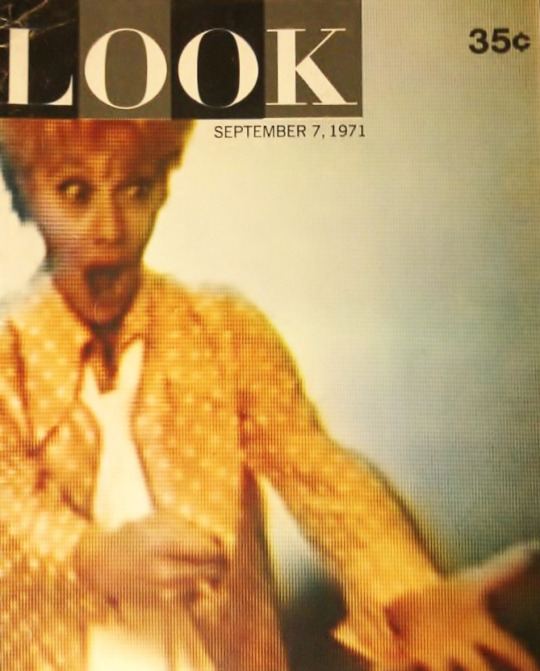
The September 7, 1971 issue of LOOK Magazine (volume 35, number 18) dedicated their entire issue to the medium of television. Inside, there is a feature titled “Lucille Ball, the Star That Never Sets...” by Laura Bergquist on page 54.
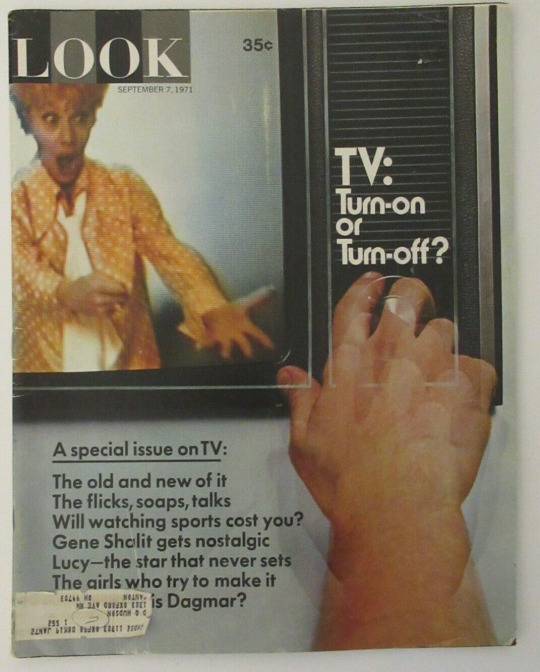
The photograph on the cover is slightly distorted to give it the look of an image through a TV screen. The shot was taken by Douglas Bergquist in January 1971.

The issue presents a variety of viewpoints about the state of television. Is it ‘tired’ or is there an infusion of new energy to take it into the new decade? John Kronenberger writes an article that asks if cable television is the future. Hindsight tells us that it was not only the future, but is now the past.

“Lucille Ball, the Star That Never Sets...” by Laura Bergquist.

Bergquist first interviewed Lucille Ball in 1956 for the Christmas issue of Look.
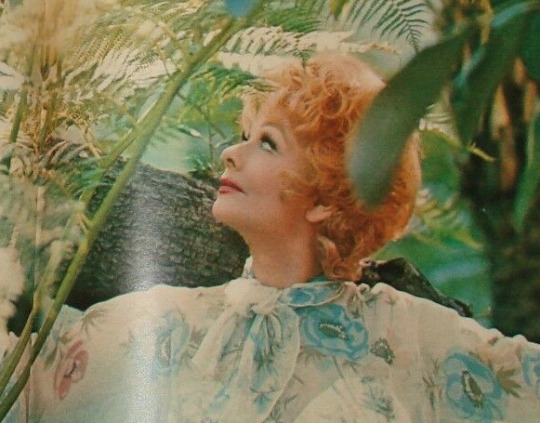
The photograph is by Douglas Kirkland, a Canadian-born photographer, who not coincidentally, also took the photograph used on the cover. This shot was taken in the garden of Ball’s home in June 1971. At age 24, Kirkland was hired as a staff photographer for Look magazine and became famous for his 1961 photos of Marilyn Monroe taken for Look's 25th anniversary issue. He later joined the staff of Life magazine.
Bergquist launches the article talking about her friend Sally, who is besot with watching Lucille Ball reruns, preferring Lucy over the news. Under the headline, she sums up the purpose of her interview: “Sorry, Sally. But Lucy is a serious, unfunny lady. So how come she’s a top clown of the fickle tube for twenty years, seen at home 11 times weekly and in 77 countries?”
LUCILLE BALL: THE STAR THAT NEVER SETS...
(Lucille Ball’s quotes are in BOLD. Footnote numbers are in parentheses.)
My neighbor Sally, nine, turns out to be a real Lucy freak. Though she likes vintage-house-wife I Love Lucy best, she'll watch Lucille Ball 11 times a week, if permitted. That's how often Madame Comedy Champ of the Tube, come 20 years this October, can be caught on my local box. Ten reruns, plus the current Here's Lucy on Monday night, CBS prime time. Friends, that's 330 weekly minutes of Lucy, which should be rank overexposure. Did you know that even the U.S. man-on-the-moon walkers slipped in ratings, second time around?
Quel mystery. Variety last fall announced that old-fashioned sitcoms and broad slapstick comedy are passé, given today's hip audiences. With one big exception - Lucy. When the third Lucy format went on in '68, reincarnating Miss Ball as a widowed secretary (with her real-life son, Desi Jr., now 18, and Lucie Jr., 20), Women's Wear Daily said not only were the kids no talent, but the show was "treacle." "One giant marshmallow," quoth the Hollywood Reporter, "impeccably professional, violence-free, non-controversial . . . 100% escapism."
Miss Ball: "Listen, that's a good review. I usually get OK personal notices, but the show gets knocked regular."
So why does Sally, like all the kids on my block, love slapstick, non-relevant Lucy? "Because she's always scheming and getting into trouble like I do, and then wriggling her way out of it." A 44-year-old Long Island housewife: "Of course I watch. I should watch the news?" When the British Royal Family finally unbent for a TV documentary, what was the tribe watching come box-time? Lucy, over protests from Prince Philip. (1)
"I've been a baby-sitter for three generations," says Miss Ball briskly. "Kids watch me during the day [she outpulls most kiddy shows]. Women and older men at night. Teen-agers, no. They look at Mod Squad. Intellectuals, they read books or listen to records.... You know I even get fan mail from China?" MAINLAND CHINA? "Hong Kong, isn't that China?" No. "Where is it anyway?"
The Statistics on the Lucy Industry are numbing. In recent years, she has run in 77 countries abroad, including the rich sheikhdom of Kuwait, and Japan, where, dubbed in Japanese yet, she's been a long-distance runner for 12 years. Where are all those funny people of yesteryear - Jackie Gleason, the Smothers Brothers, Sid Caesar, the Beverly Hillbillies - old reliables like Ed Sullivan, Red Skelton? Gone, all gone, form the live tube - except for reruns dumped by sponsors, out of fashion, murdered in the ratings.
Even this interview is a rerun. Fifteen years ago, I sat in Miss Ball's old-timey movie-star mansion in Beverly Hills, wondering how much longer, oh Lord, could Lucy last? She has a different husband, a genial stand-up comic of the fast-gag Milton Berle school, Bronx-born Gary Morton, 49. He replaced Desi Arnaz, her volatile Cuban spouse (and costar and partner) of 20 years, who lives quietly in Mexico's Baja California, alongside a pool shaped like a guitar, with a second redhead wife. "Ever been here before?" asks Gary, now her executive producer, who's brightened the house decor. "Used to be funeral-parlor gray, right?"
Otherwise, the lady, like her show, seems preserved in amber. Though newly 60, she could be Sally's great-grandmother. Of a Saturday, she's unwinding from a murderous four-day workweek. Her pink-orange-fireball hair is up in rollers. Her black-and-blue Rolls-Royce, inherited from her friend, the late Hedda Hopper, is parked in the driveway. But in attitude and opinion, she comes across Madame Middle America, despite the shrewd show-biz exterior. Good egg. Believer in hard work, discipline, Norman Vincent Peale. Deadeye Dickstraight, she talks astonishingly unfunny - about Vietnam, Women's Lib, about which she feels dimly, marriage to Latins, books she toted up to her new condominium hideaway in Snowmass, Colo. "Snow" is her new-old passion, a throwback to her small-town Eastern childhood. For the first time in family memory, this lifelong workhorse actually relaxed in that 9,700-foot altitude for four months this year, learning to ski, reading Pepys, Thoreau, Shirley MacLaine's autobiography, "37 goddamned scripts, and all those Irvings" (Stone, Wallace, etc.). She had scouted for a mountain retreat far away from any gambling. Why? Is she against gambling? "No, I'm a sucker. I can't stay away from the tables."
From yellowing notes, I reel off an analysis by an early scriptwriter. Perhaps she comes by her comic genius because of some "early maladjustment in life, so you see commonplace things as unusual? To get even, to cover the hurt, you play back the unhappy as funny?"
Forget any deep-dish theorizing. "Listen, honey," says Miss B, drilling me with those big blue peepers, "you've been talking to me for four, five hours. Have you heard me say anything funny? I tell you I don't think funny. That's the difference between a wit and a comedian. My daughter Lucie thinks funny. So does Steve Allen, Buddy Hackett, Betty Grable."
BETTY GRABLE THINKS FUNNY? "Yeah. Dean Martin has a curly mind. oh, I can tell a funny story about something that happened to me. But I'm more of a hardworking hack with an instinct for timing, who knows the mechanics of comedy. I picked it up by osmosis, on radio and movie lots [she made 75 flicks] working with Bob Hope, Bert Lahr, the Marx Brothers, the Three Stooges - didn't learn a thing from them except when to duck. Buster Keaton taught me about props. OK, I'm waiting."
Well, I hedge, I caught Miss Ball in a few funny capers on the Universal lot this week. Like one day, in her star bungalow, she throws a quick-energy lunch in the blender - four almonds, wild honey, water, six-year-old Korean ginseng roots, plus her own medicine, liver extract. "AAAGH," she gags, then peers in the mirror at her hair, which is a normal working fright wig, "Gawd," she moans, "it looks as if I'd poked my finger into an electric-light socket!" No boffo line, but her pantomimed horror makes me laugh out loud. Working, she is fearless - dangling from high wires, coping with wild beasts. She talks of animals she's worked with, chimps, bears, lions, tigers. "I love 'em all, especially the chimps, but you can't trust their fright or panic. Like that baby elephant who gave a press job to a guest actress." (2) What's a press job? "Honey, once an elephant puts his head down, he keeps marching, right through walls." Miss Ball puts her own head down, crooks an arm for a trunk, and voila, is an elephant. Funny as hell. So off-camera she's no great wit, but then is Chaplin?
Four days a week, through the Thursday night filming before a live audience, she labors like some hungry Depression starlet. Monday a.m., she sits at the head of a conference table, lined by 12 staffers, editing the script. Madame Executive Tycoon in charge of everything, overseeing things Desi used to do. Also the haus-frau, constantly opening windows for fresh air and emptying ashtrays. She wears black horn-rims, three packs of ciggies are at the ready. "Do I have to ask for a raise again?" she impatiently drills the writers, "I've done that 400 times." "QUIET!" she yells during rehearsal, perching in a high director's chair, a la Cecil B. DeMille. "Isn't somebody around here supposed to yell quiet?" She frets about the new set. "Those aisles - they're a mile and a half wide. What for?" The audience is too far away, she won't get the feedback from their laughs are her life's blood. (Once I hear Gary Morton on the phone, in his British-antiqued executive office, saying: "We need your laugh, honey. Go down to the set and laugh; that's an order.")
That physical quality about her comedy, a la the old silent movies or vaudeville - which were the big amusements of her youth - seems to transcend any language. (A Moscow acting school, I was told, shows old Lucy clips as lessons in comic timing.) So what did she learn from that great Buster Keaton?
"At Metro, I kept being held back by show-girl-glamour typing. I always wanted to do comedy. Buster Keaton, a friend of director Eddy Sedgwick, spotted something in me when I was doing a movie called DuBarry - what the hell was the name? - and kept nagging the moguls about what I could do. Now a great forte of mine is props. He taught me all about 'em. Attention to detail, that's all it is. He was around when I went out on a vaudeville tour with Desi with a loaded prop." What's that? "Real Rube Goldberg stuff. A cello loaded with the whole act - a seat to perch on, a violin bow, a plunger, a whistle, a horn. Honey, if you noodge it, you've lost the act. Keaton taught me your prop is your jewel case. Never entrust it to a stagehand. Never let it out of your sight when you travel, rehearse with it all week." Ever noodge it? "Gawd, yes. Happened at the old Roxy in New York. I was supposed to run down that seven-mile aisle when some maniac sprang my prop by leaping out and yelling 'I'm that woman's mother! She's letting me starve.'" What did you do? "Ad-libbed it, and I am one lousy ad-libber."
After 20 years, isn't she weary of playing the Lucy character? "No, I'm a rooter, I look for ruts. My cousin Cleo [now producer of Here's Lucy] is always prodding me to move. She once said Lucy was my security blanket. Maybe. I'm not erudite in any way, like Cleo. But why should I change? Last year was big TV relevant year, and I made sure my show wasn't relevant. Lucy deals in fundamental, everyday things exaggerated, with a happy ending. She has a basic childishness that hopefully most of us never lose. That's why she cries a lot like a kid - the WAAH act - instead of getting drunk."
Aha! Is Lucy the guileful child-woman, conniving forever against male authority - whether husband or nagging boss - particularly FEMALE? ("None of us watch the show," sniffed a Women's Libber I know, "but she must be an Aunt Tom." Still, I ponder, hasn't that always been the essence of comedy, the little poor-soul man - or woman - up against the biggies?)
"I certainly hope so. You trying to con me into talking about Women's Lib? I don't know the meaning of it. I never had anything to squawk about. I don't know what they're asking for that I don't have already. Equal pay for equal work, that's OK. The suffragettes rightly pressed a hard case - and when roles like Carry Nation come along, they ask me to play them, perhaps because I have the physical vitality. But they're kind of a laughingstock, aren't they? Like that girl who gave her parents 40 whacks with an ax? Didn't Carry Nation ax things, was she a Prohibitionist or what?" (3)
She'd just said nix to playing Sabina, in the movie of Thornton Wilder's The Skin of Our Teeth. Why? "I didn't understand it." She turned down The Manchurian Candidate for the same reason. "Got that Oh Dad, Poor Dad script the same week and thought I'd gone loony." If she makes another movie, she'll play Lillian Russell in Diamond Jim with Jackie Gleason, "a nice, nostalgic courtship story that won't tax anyone's nerves." (4)
Is Miss Ball warmed by the comeback of old stars in non-taxing Broadway nostalgia shows like No, No, Nanette? (5)
"Listen, I studied that audience. I saw people in their 60's and 70's enjoying themselves. That had to be nostalgia. The 30's and 40's smiled indulgently, that Ruby Keeler is up there on the stage alive, not dead. For the below 30's, it's pure camp. I don't put it down, but it’s not warm, working nostalgia, but the feeling 'Ye gods, anything but today'
"Maybe I'm more concerned about things that I realize. I told you politics is definitely not on my agenda - I got burned bad, back in the '40's signing a damned petition as a favor. (6) Just say the word 'politician,' and I think of chicanery. Too many subversive angles today. But I must be one of millions who are so fed up, depressed, sobbing inside, about the news...the atrocities, the dead, the running down of America. You can't obliterate the news, but the baddest dream is that you feels so helpless.
"I was sitting in this very chair one night, flipping the dial, and came to Combat! There were soldiers crouching in bushes, a helicopter hovering overhead. Nothing happening, so I make like a director, yelling, 'Move it! This take is too LONG!' It turned out to be a news show from Vietnam. That shook me. There I was criticizing the director, and real blood was dripping off my screen... That drug scene bugs me. It's ridiculous, self-indulgent. We're supposed to be grateful if the kids aren't on drugs. They're destroying us from within, getting at our youth in the colleges. OK, kids have to protest, but how can they accomplish anything if they're physically shot?
"One of the reasons I'm still working is that people seem grateful that Lucy is there, the same character and unchanging view. There's so much chaos in this world, that's important. Many people, not only shut-ins, depend on the tube, too much so - they look for favorites they can count on. Older people loved Lawrence Welk. They associated his music with their youth. Now he's gone. It's not fair. (7) They shouldn't have taken off those bucolic comedies; that left a big dent in some folks' lives. Maybe we're not getting messages anymore from the clergy, the politicians, so TV does the preaching. But as an entertainer, I don't believe in messages.
"Some Mr. Jones is always asking why am I still working - as if it were some crime or neurotic. OK, I'll say it's for my kids. But I like a routine life, I like to work. I come from an old New England family in which everyone worked. My grandparents were homesteaders in New York and Ohio. My mother worked all her life - during the Depression in a factory."
What does she think of the new "relevant" comedy like All in the Family? "I don't know... It's good to bring prejudice out in the open. People do think that way, but why glorify it? Those not necessarily young may not catch the moral. That show doesn't go full circle for me."
Full circle?
"You have to suffer a little when you do wrong. That prejudiced character doesn't pay a penance. Does he ever reverse a feeling? I'm for believability, but I'm tired of hearing 'pig,' 'wop,' 'Polack' said unkindly. Me, I have to have an on-the-nose moral. Years ago, the Romans let humans be eaten by lions, while they laughed and drank - that was entertainment. But I’m tired of the ugly. Fred Astaire and Ginger Rogers dancing, that's my idea of entertainment. Anything Richard Burton does is heaven. Easy Rider scared me at first because I knew how it could influence kids. But at least that movie came full circle. They led a life of nothing and they got nothing. Doris Day, I believe in her. Elaine May? A kook, but a great talent. Barbra Streisand? A brilliant technician."
On her old ten-minute daily interview radio show, (8) she once asked Barbra, like any star-struck civilian: How does it feel to be only 21, a big recording artist and star of the Broadway hit Funny Girl? "Not much," said Barbra. "That cool really flustered Lucille. It violated everything she believes in," says cousin Cleo Smith, who grew up with Miss B in small-town Celoron, N.Y. "For her, nothing ever came easy. She didn't marry until she was 30, or become a really big star until she was 40. She's still so hard on herself, sets such rigorous standards for herself as an actress and parent. She honestly believes in all the old maxims, that a stitch in time saves nine, etc. She's literal-minded, a bit like Scarlett O'Hara. Does what needs doing today, and to hell with tomorrow."
Her self-made wealth a few years ago was reckoned at $50 to $100 million. After her divorce, she reluctantly took over the presidency of the Desilu studio and sold it six years later to the conglomerate Gulf & Western for nearly $18 million. Does that make her the biggest lady tycoon in Hollywood? (The 179 original I Love Lucy reruns now belong, incidentally, to a CBS syndicate; her second Lucy Show, to Paramount. She owns only the current Here's Lucy - OK, go that straight?)
"Hah! Like Sinatra, I owe about three and a half million bucks all the time. That figure is ridiculous. All my money is working. I lost a helluva lot in the stock market last year and haven't recouped it. It's an illusion that people in show biz are really rich. The really filthy rich are the little old ladies in Boston, the old folks in Pasadena, who've had dough for years and haven't been seen since."
The divorce from Desi Arnaz can still set her brooding. "It was the worst period of my life. I really hit the bottom of despair - anything form there on had to be up. Neither Desi nor I has been the same since, physically or mentally, though we're very friendly, ridiculously so. Nobody knows how hard I tried to make that marriage work, thinking all the trouble must be my fault. I did everything I could to right that ship, trotting to psychiatrists. I hate failure, and that divorce was a Number One failure in my eyes... Anything in excess drives me crazy. He'd build a home anyplace he was, and then never be around to enjoy it. I was so idealistic, I thought that with two beautiful babies, and a beautiful business, what more could any man want? Freedom, he said, but he had that. People don't know what a job he did building that Desilu empire, what a great director and brilliant executive he was yet he let it all go....Maybe Latins have an instinct for self-destruction..."
Was that the conflict, a Latin temperament married to an old-fashioned American female? "It has a helluva lot to do with getting into it and getting out. The charm. But they keep up a big facade and don't follow through. No, the machismo didn't bother me, I like to play games too.
"Desi and I had made an agreement that if either of us wanted to pull out of Desilu, the other could buy. I wanted to go to Switzerland with the kids, anywhere to run away, but he wanted out. The I found out that for five years, our empire had taken a nose dive, and if I wanted to get my money back, I had to rebuild it first. For the first time in my life, I was absolutely terrified - I'd never run any show or a big studio. When I came back from doing the musical Wildcat on Broadway, I was so sick, so beat, I just sat in that backyard, numb, for a year. I'd had pneumonia, mononucleosis, staph, osteomyletis. Lost 22 pounds. Friends told me the best thing I could do physically, psychologically, was go back to work, but could I revive Lucy without Desi, my old writers, the old crew?"
You didn't like being a woman executive? "I hated it. I used to cry so much - and I'm not a crier - because I had to let someone go or make decisions I didn't understand. There were always two sides to every question, and trouble was I could see both sides. No one realizes how run-down Desilu was. The finks and sycophants making $70,000 a year, they were easy to clean out. Then during the CBS Jim Aubrey regime, I couldn't sell the new pilots we made - Dan Dailey, Donald O'Connor, Ethel Merman. I couldn't sell anything but me." (9)
Was it tough to be a woman bossing men? "Yeah. It puts men in a bad spot. I could read their minds, unfortunately, wondering who is this female making this decision, not realizing that maybe I'd consulted six experts first. I'm all wrong as an executive, I feel out of place. I have too many antennae out, I'm too easily hurt and intimidated. But I can make quick surgical incisions. I've learned that much about authority - give people enough rope to hand themselves, stand back, let them work, but warm them first. Creative people you have to give special leeway to, and often it doesn't pay off. Me, I'm workative, not creative. I can fix - what I call 'naturalize.' I'm a good editor, I can naturalize dialogue, find an easier way to do a show mechanically.
But I didn't make the same marriage mistake twice. Gary digs what my life is, why I have to work. We have tranquility. We want the same things, take care of what we have."
She shows me Gary's dressing room, closets hung with shirts and jackets - by the dozen. "My husband is a clothes and car nut, but it's a harmless vice. Better than booze or chasing women, right?" (His cars include a 1927 Model T Ford, a Mercedes-Benz 300 SL, an Astin Martin, a Rolls-Royce convertible.)
"Anyone married to me has an uphill climb. Gary and I coped by anticipating. We knew we should be separated eight, nine months a year, so he tapered off his act, found other thing to do - making investments, building things. He plays the golf circuit, Palm Springs, Pebble Beach, and tolerantly lets me stay at Snowmass for weeks. Sun just doesn't agree with me. He didn't come into the business for five years. I didn't want to put him in a position in which he would be ridiculed. I could tell that he was grasping things - casting, story line. I said, 'You've been a big help to me. You should be paid for it.' "
On a Friday night, I dine with the Mortons. Dinner is served around 6:30, just like in my Midwest hometown. Lucille is still fretting about this week's show - "over-rehearsed; because there were so many props, the fun had gone out of it." Gary, just home from unwinding his own way - golfing with Milton Berle, Joey Bishop - asks if I'd like something to drink with dinner? Coke or ginger ale? "No? I think we have wine." No high living in this house, but the spareribs are superb. "Laura asked me an interesting question," he tells his wife. "Like isn't there a conflict when a husband in the same business - comedy - marries a superstar? I told her I'd never thought of it before."
They met the summer when Lucille was rehearsing Wildcat, and he was a stand-up comic at Radio City Music Hall, seven days a week. "We both came up the hard way," he says. "I got started in World War II, clowning for USO shows. I've been in show biz for 30 years and can appreciate what she goes through. Lucy can't run company by herself. Maybe with me around, when she walks on the set, her mind is at peace. I pop in from time to time, on conferences, rehearsals. I can tell from her if things are going well, if the laughter is there. She's a thoroughbred, very honest with me, a friend to whom I can talk about anything. She never leaves me out of her life; that's important for a man. Do you know how many bets were lost about our marriage lasting? It's been nearly ten years now, and I've slept on the couch only once."
Past dinner, we adjourn promptly to the living room, and a private showing of Little Murders. It's not a pretty movie of urban American life, and Lucy talks back indignantly to the screen. (10) The flick she rally like was George Plimpton's Paper Lion, with the Detroit Lions, which she booked under the illusion it was an animal picture. "At the end, 12 of us here stood up and cheered, and I wrote every last Lion a fan note. You know that picture hardly made a dime?"
On a house tout, I'd noted the Norman Rockwell and Andrew Wyeth albums in the living room, and a memo scotch-taped to her bathroom wall: "Get Smart with N.V.P."
N.V.P. Is that Norman Vincent Peale, her old friend and spiritual mentor? "Yes. He marred me and Gary. I still adhere to his way of thinking because he preaches a day-to-day religion that I can understand. Something workable, not allegory. Like how do you get up in the morning and just get through the day?
"Dr. Peale taught me the art of selfishness. All it means is doing what's right for you, not being a burden to others. When I was in Wildcat, he dropped around one night saying, 'I hear you're very ill, and working too hard.' 'Work never hurt anybody,' I protested. But he reminded me I had two beautiful children to bring up, and if I was in bad shape, how could I do it? I've learned you don't rake more leaves than you can get into the wheelbarrow. I've always been moderate, but I was too spread around, trying to please too many people. You don't become callous, but you conserve your energies."
What about her kids? Passing a newsstand, I'd noted a rash of fan mags blazoned with headlines about Desi Jr., something of a teen-age idol, and at 18 a spitting image of old pop. (A rock star at 12, he'd recently garnered very good notices indeed for a movie role in Red Sky at Morning.) "Why Lucille Ball's Son Is So Bitter About His Own Mother," read the El Trasho covers. "Patty Duke Begs Desi Jr. To Believe Her: 'You Made Me Pregnant.' " Does the imbroglio bother this on-the-nose moralist?
"I worked for years for a quiet personal life and to have to personally impinged on, with no recourse, is hard. I brought Patty to the house, feeling very maternal about her, saying look at this clever girl, what a big talent she is. Now, I can thank her for useless notoriety. She's living in some fantastic dreamworld, and we're the victims of it. Desi being the tender age of 17 when they met, she used him. She hasn't proved or asked for anything. I asked Desi if he wanted to marry her and he said no. My daughter helped outfit the baby, which Patty brought to the house, but did she ever say thank you?
"Desi's going to CIA this fall." Not the CIA? No, the new California Institute of the Arts, where he'll study music. "Yes, he's very much like his father, too much sometimes - I just hope he has Desi's business acumen. I'm glad he didn't choose UCLA or Berkeley or a school full of nonconformists. Lucie just now wants marriage and babies - maybe she'll go on to college later.
"I took the kids out of school deliberately. Desi was at Beverly Hills High, Lucie at Immaculate Heart."
Why? "I didn't like the scene - it was the usual - pregnant girls, drugs." That goes on at Immaculate Heart? Sure. "A lot of girls who boarded there were unhappy misfits, and Lucie was already working in the nunnery. All the friends she brought home were the rejected. I'm that way myself."
Did they mind, well, your stage-managing their lives? "No, they were as sick of that weird high school scene as I was. I made them a proposition - told them to think it over for a month, while I was in Monaco. Do you want to be on the show? I told them the salary would be scale, that most would be put in trust. They'd be tutored and not able to graduate with their classes. They both thought they were going to the coast, but working with a tutor, they really got turned on by books for the first time. They wanted to be in show business, and I wanted to keep an eye on them."
Of course her show is nepotism, she grants. "Cleo thought a long time before becoming the producer, wondering if it wasn’t overdoing family. Nobody seems to be suffering from it, I told her." Thursday night show time is like a tense Broadway opening night. Gary Morton, in stylish crested blazer, warms up the audience, heavy with out-of-town tourists. "Lucy started out with another fellow, can't remember his name.... What is home without a mother? A place to bring girls." Lucille bursts out onstage, exuding the old MGM glamour, fireball hair ablaze, eyelashes inches long, in aquamarine-cum-rhinestone kaftan. "For God's sake," she implores, "laugh it up! We want to hear from you... Gary, have you introduced my mom?" Indeed he has. Loyal, durable, 79-year-old Desiree "DeDe" Ball, her hair pink as Lucille's, has missed few of the 409 Lucy shows filmed to date, and is on hand as usual with 19 personal guests. Gary also asks for big hands for Cleo, and her husband Cecil Smith, TV critic for the LA Times, who has also appeared on the show. (11)
One day Desi Jr. wanders on the set, just back from visiting his father in Mexico. He'd gone with Patty Duke and the baby. The young man does have Latin charm, and apparently talent. I ask him a fan-mag query: Is it rough to be the spin-off of such famous show-biz parents?
"Well, I grew up with kids like Dean Martin, Jr., and Tony Martin, Jr., and we had a lot in common." What? "We all had houses in Palm Springs." Any generational problem with Mom? "She's found the thing she's best at, and sticks to it. As long as she has Snowmass, she has an escape, some reality. I realize she lives half in a man's world, and that must be tough on a woman. My father - he worked hard for years, and then he'd had it. This is silly, weird, he felt. He aged more in ten years than he had in 40. I'm like him. I feel life is very short. He's had major operations recently, and he's changed a lot."
Patty Duke is six years older than Desi Jr., paralleling the six-year age gap that separated parents Lucy and Desi. "Patty is a lot like my mother, the same drive, and strong will, a perfectionist...But I'm never going to get married. Marriage is unrealistic, expecting you to devote a whole life unselfishly to just one person. Do you know people age unbelievably when they marry? From what I've seen, 85 percent of married couples are miserable; 14 percent, just average; one percent, happy." (12)
His mother's own childhood, in little Celoron, an outspring of Jamestown, N.Y., was oh-so-different from her kids'. "She was always a wild, tempestuous, exciting child," say Cleo, "doing things that worried people, plotting and scheming, though she knew she'd get in trouble." Interesting, because that's one basic of the Lucy format, Miss B forever finagling second bananas like Vivian Vance into co-trouble. "One summer, she conned me into running away. It was only to nearby Fredonia, but in her sneaky way she really wanted to catch up to a groovy high school principal who was teaching there. He played it very cool, calling Mom and telling her we were staying overnight in a boarding house. On his advice, when we got home, DeDe acted as if we hadn't been away. That devastated Lucille, no reaction, nothing."
The classic Lucy story line also has her conniving against male authority, whether husband or boss, now played by Gale Gordon. "I need a strong father or husband figure as catalyst. I have to be an inadequate somebody, because I don't want the authority for Lucy. Every damned movie script sent me seems to cast me as a lady with authority, like Eve Arden or Roz Russell, but that's not me.
"No, I don't remember my own father," says Miss Ball. "He was a telephone lineman who died of typhoid at 25, when I was about three. I do remember everything that day, though. Hanging out the window, begging to play with the kids next door who had measles... The doctor coming, my mother weeping. I remember a bird that flew in the window, a picture that fell off the wall.
"My brother Fred [who was born after her father's death] was always very, very good. He never did anything wrong - he was too much to bear. I was always in trouble, a real pain in the ass. I suppose I wasn't much fun to be around." To this day, says Cleo, Lucille suspects Fred is her mother's favorite, even though DeDe has devoted her whole life to this daughter.
Family ties were always fierce-strong. After her father's death, "We lived with my mother's parents, for a while. Grandpa Hunt was a marvelous jack-of-all-trades, a woodturner, eye doctor, mailman, bon vivant, hotel owner. [And also an old-fashioned Populist-Socialist.] He met my grandmother, Flora Belle, a real pioneer woman and pillar of the family, when she was a maid in his hotel. She was a nurse and midwife, an orphan who brought up four pairs of twin sisters and brothers all by herself. He took us to vaudeville every Saturday and to the local amusement park. When Grandma died at 51, all us kids had to pitch in, making beds, cooking.
"Yeah, I guess I am real mid-America, growing up as a mix of French-Scotch-Irish-English, living on credit like everyone else, paying $1.25 a week to the insurance man, buying furniture on time. But it was a good, full life. Grandpa took us camping, fishing, picking mushrooms, made us bobsleds. We always had goodies. I had the first boyish bob in town and the first open galoshes.
"My mother then married Ed Peterson, a handsome-ugly man, very well-read. He was good to me and Freddy but he drank too much. He was the first to point out the magic of the stage. A monologist came to town on the Chautauqua circuit. He just sat onstage with a pitcher of water and light bulb and made us laugh and cry for two hours. For me, this was pure magic. When I was about seven, Ed and mother moved to Detroit, leaving me with his old-fashioned Swedish parents, who were very strict. I had to be in bed at 6:30, hearing all the other kids playing outside in the summer daylight. Maybe it wasn't that traumatic, but I realize now it was a bad time for me. I felt as if I'd been deserted. I got my imagination to working, and read trillions of books."
The adult Lucille, talking to interviewers, used to go on and on about her "unhappy" childhood, little realizing that she was reflecting on her mother, to whom she is passionately devoted. "Just how long do you think you lived with the Petersons?" asked DeDe one day in a confrontation. "Three YEARS? Well I tell you it was more like three weeks."
"I left home at 15, much too early, desperate to break into the big wide world. Looking for work in New York show biz was ugly, without any leads or friends or training other than high school operettas and plays and Sunday school pageants. I was very shy and reticent, believe it or not, and I kept running home every five minutes. I got thrown in with older Shubert and Ziegfeld dollies and, believe me, they were a mean, closed corporation. I don't understand kids today who get easily discouraged and yap about doing their own thing. Don't they know what hard work is? Where are their morals? I always knew when I did wrong, and paid penance."
Yet she was venturesome enough to sit in on some recent Synanon group-therapy sessions for drug addicts. "They wanted me to raise some money, and I wanted to find out what it was about. The games were fascinating, wonderful, until I couldn't take it any more. The other participants kept bugging me: What are you here for? Are your children drug addicts? I had to start making up problems."
For two decades, she's been risking her neck in those murderous ratings, outlasting long-ago competitors like Fulton Sheen, and now up against such pleasers as pro football and Rowan and Martin. (13)
Suppose the ratings drop, what would she do?
No idea. "Might take a trip on the Inland Waterway form Boston to Florida. In my deal with Universal, I can make specials, other movies, TV pilots. I wouldn't have to ski 'spooked' at Snowmass." What's that? "Honey, I have to be careful. If I break a leg 500 people are out of work. (14) I'd be happy in some branch of acting with some modicum of appreciation. Listen, it never occurred to me, in life that I'd fail ever, because I always appreciated small successes. I never had a big fixed goal. When I was running Desilu, it drove me wild when people asked, 'Aren't you proud to own the old RKO studio where you once worked as a starlet?' What $50-a-week starlet ever walked around a lot saying, 'I want to own this studio'?
"I don't know what you've been driving at, what's your story line? But it's been interesting, talking."
FOOTNOTES: HINDSIGHT IS 20/20
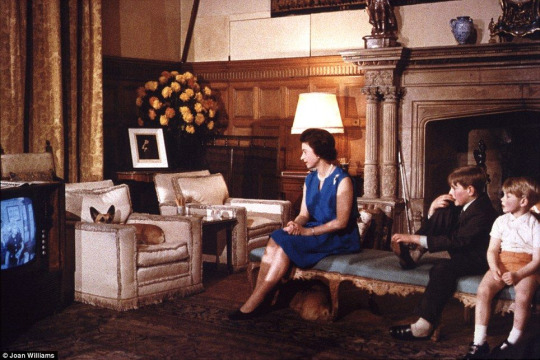
(1) This refers to a rare 1969 BBC documentary about Britain’s royal family that gave the public an inside look at the life of the Windsors. In one scene, the family was watching television, and on the screen was “I Love Lucy”, much to the chagrin of Prince Philip. Queen Elizabeth and Prince Philip were mentioned on the series, especially in the episode “Lucy Meets the Queen” (ILL S5;E15).
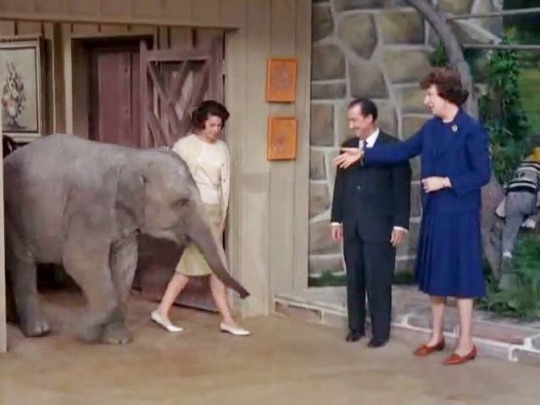
(2) Lucy is referring to a 1967 episode of “The Lucy Show” titled “Lucy The Babysitter” (TLS S5;E16) in which Lucy Carmichael babysits three rambunctious chimps for their parents, played by Jonathan Hole and Mary Wickes. In the final moments of the show, Wickes reveals a fourth sibling - a baby elephant! The animal went wild and pushed Wickes (what Ball described as a “press job”) into one of the prop trees. The trainer had to physically subdue the elephant to get it away from Wickes, who injured her arm. The final cut ends with the entrance of the baby elephant.

(3) Lucy is conflating (probably intentionally) the stories of real-life prohibitionist Carrie Nation (1846-1911), who famously hacked up bars and whisky barrels with an axe, and Lizzie Bordon (1860-1927), who famously hacked up her parents with an axe. (Photo from the 1962 TV special “The Good Years” starring Lucille Ball and Henry Fonda.)

(4) There was never a film version of Thornton Wilder’s play Skin Of Our Teeth which was on Broadway in 1942 starring Tallulah Bankhead as Sabina, the role offered to Ball. There were several television adaptations; one in Australia in 1959; one in England the same year starring Vivian Leigh as Sabina; one in the USA in 1955 starring Mary Martin (above) as Sabina; and a filmed version of a stage production starring Blair Brown as Sabina in 1983. Although it is possible that Lucille Ball might have been considered for the role of the sexy housemaid Sabina in 1955, the article says that the role was “just” offered to her, so it probably refers to a 1971 project that never materialized. Wilder’s story tracks a typical American family from New Jersey from the ice age through the apocalypse.

(5) In 1971, there was a popular revival of the 1925 musical comedy No, No, Nanette on Broadway. The cast featured veteran screen star Ruby Keeler and included Helen Gallagher (playing a character named Lucille, coincidentally), Bobby Van, Jack Gilford, Patsy Kelly and Susan Watson. Busby Berkeley, nearing the end of his career, was credited as supervising the production, although his name was his primary contribution to the show. The 1971 production was well-reviewed and ran for 861 performances. It sparked interest in the revival of similar musicals from the 1920s and 1930s. The original 1925 cast featured Charles Winninger, who played Barney Kurtz, Fred’s old vaudeville partner on “I Love Lucy.” In that same episode (above), they sing a song from the musical, "Peach on the Beach” by Vincent Youmans and Otto Harbach. Like the revue in the episode, the musical is set in Atlantic City, New Jersey.
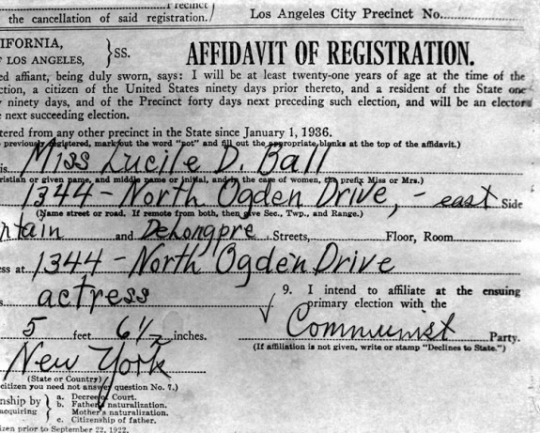
(6) Lucy is referring to her 1936 affidavit of registration to join the Communist Party. Lucille said she signed it to appease her elderly grandfather. The cavalier act caught up with Ball in 1953, when zealous red-hunting Senator Joe McCarthy tried to purge America of suspected Communists. Although many careers were ruined, Ball escaped virtually unscathed.
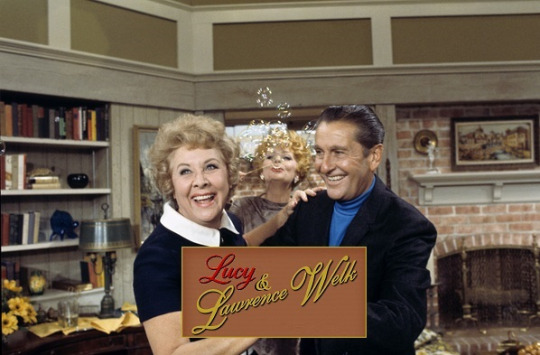
(7) The popular big band music series “The Lawrence Welk Show” (1955) was unceremoniously canceled in 1971 by ABC, in an attempt to attract younger audiences. What Lucy doesn’t mention is that four days after this magazine was published, the show began running brand new shows in syndication, which continued until 1982. Welk, despite not being much of an actor, played himself on “Here’s Lucy” (above) in January 1970.
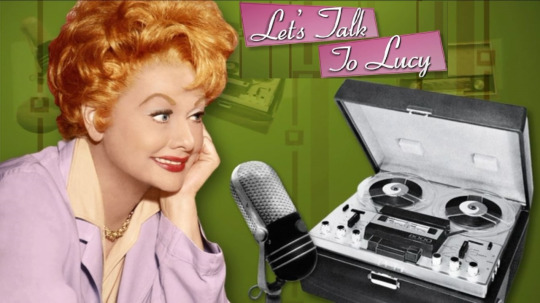
(8) “Let’s Talk To Lucy” was a short daily radio program aired on CBS Radio from September 1964 to June 1964. Most interviews (including Streisand’s) were spread over multiple installments.

(9) To showcase possible new series (pilots) Desilu and CBS aired “Vacation Playhouse” (1963-67) during the summer when “The Lucy Show” was on hiatus. This would often be the only airing of Lucy’s passion projects. “Papa GI” with Dan Dailey as an army sergeant in Korea who has his hands full with two orphans who want him to adopt them. The pilot was aired in June 1964 but it was not picked up for production. “Maggie Brown” had Ethel Merman playing a widow trying to raise a daughter and run a nightclub which is next to a Marine Corps base. The pilot aired in September 1963, but went unsold. “The Hoofer” starring Donald O’Connor and Soupy Sales as former vaudevillians aired its pilot in August 1966. No sale!

(10) Little Murders (1971) was a black comedy based on the play of the same name by Jules Feiffer. The film is about a young nihilistic New Yorker (Elliott Gould) coping with pervasive urban violence, obscene phone calls, rusty water pipes, electrical blackouts, paranoia and ethnic-racial conflict during a typical summer of the 1970s. Definitely not Lucille Ball’s style of comedy! Paper Lion (1968) was a sports comedy about George Plimpton (Alan Alda) pretending to be a member of the Detroit Lions football team for a Sports Illustrated article.
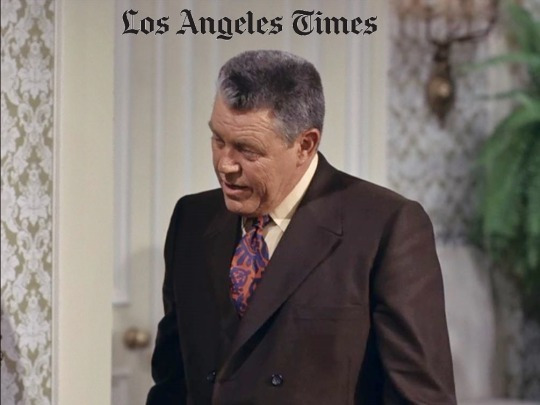
(11) Cecil Smith appeared in “Lucy Meets the Burtons” (HL S3;E1) in 1970 playing himself, a member of the Hollywood Press with a dozen other real-life writers. The casting was a way to get better coverage of the episode (featuring power couple Dick Burton, Liz Taylor, and her remarkable diamond ring). The gambit worked and the episode was the most viewed of the entire series.

(12) Desi Jr.’s 1971 views on marriage did not last. He married actress Linda Purl in 1980, but they divorced in 1981. In October 1987, Arnaz married dancer Amy Laura Bargiel. Ten years later they purchased the Boulder Theatre in Boulder City, Nevada and restored it. They lived in Boulder with their daughter, Haley. Amy died of cancer in 2015, at the age of 63.
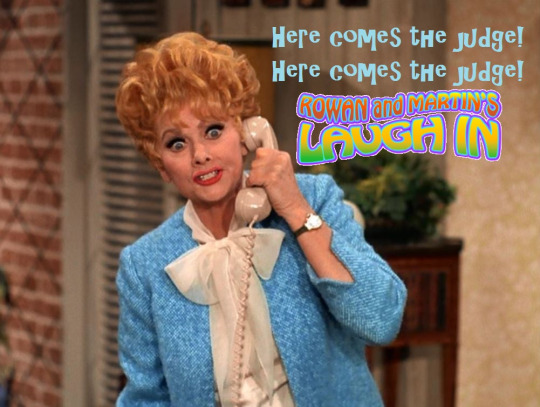
(13) From 1952 to 1957, Catholic Bishop Fulton J. Sheen hosted the inspirational program “Life Is Worth Living”, winning an Emmy Award in 1953, alongside winners Lucille Ball and “I Love Lucy.” “Here’s Lucy” was programmed up against “Monday Night Football” on ABC and “Rowan and Martin’s Laugh-In” on NBC. Instead of ignoring her competition, Ball embraced them by featuring stories about football and incorporating many of the catch phrases and guest stars from “Laugh-In.”

(14) Lucy spoke too soon! Just a few months after this interview was published Ball did indeed have a skiing accident in Snowmass and broke her leg. With season five’s first shooting date approaching, Ball was faced with either ending the series or re-write the scripts so that Lucy Carter would be in a leg cast. She chose the latter, even incorporating actual footage of herself on the Snowmass slopes (above) into "Lucy’s Big Break” (HL S5;E1).

Elsewhere in the Issue...
“This Was Our Life” by Gene Shalit includes images of Lucille Ball in the collage illustration.
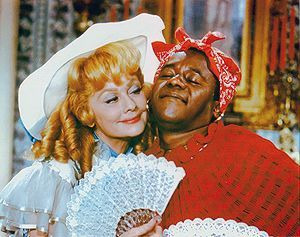
A week after this issue of Look hit the stands, the fourth season of “Here’s Lucy” kicked off with guest star Flip Wilson and a parody of Gone With the Wind. Three days later, Ball guest-starred on his show.

Not to be outdone, LOOK’s rival LIFE also devoted an entire issue to television, on news stands just three days later.
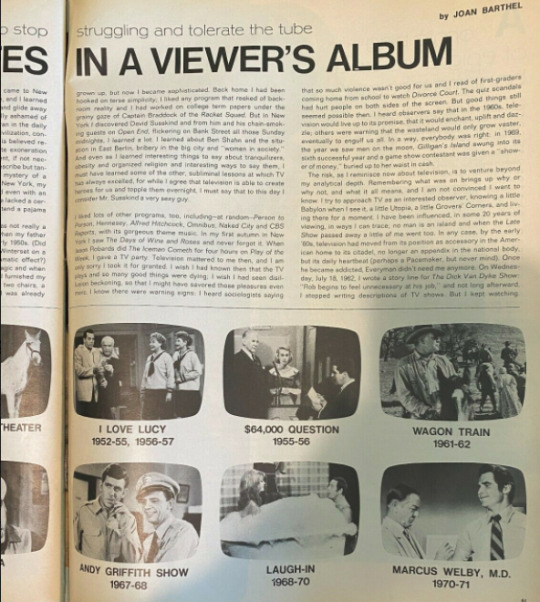
Naturally, “I Love Lucy” didn’t escape mention! I’m not sure why the show’s run is bifurcated: 1952-55, 1956-57. Actually, the show began in 1951 and ran continually until 1957.

Click here for more about Look, Life and Time!
#Look Magazine#1971#Lucille Ball#Here's Lucy#Lucy#Laura Bergquist#Douglas Kirkland#Desi Arnaz Jr.#Cleo Smith#Cecil Smith#Little Murders#Flip Wilson#Snowmass#Lawrence Welk#Let's Talk To Lucy#Mary Martin#Skin of Our Teeth#I Love Lucy#No No Nanette#The Good Years#The Lucy Show#Mary Wickes#Royal Family#Paper Lion#Television#TV Guide
7 notes
·
View notes
Text
Hollywood Reporter, November 13
I’m out of tabloids until Monday afternoon, but my OCD remains :)
Cover: Actress Roundtable -- Laura Dern, Lupita Nyong’o, Jennifer Lopez, Renee Zellweger, Awkawfina, Scarlett Johansson
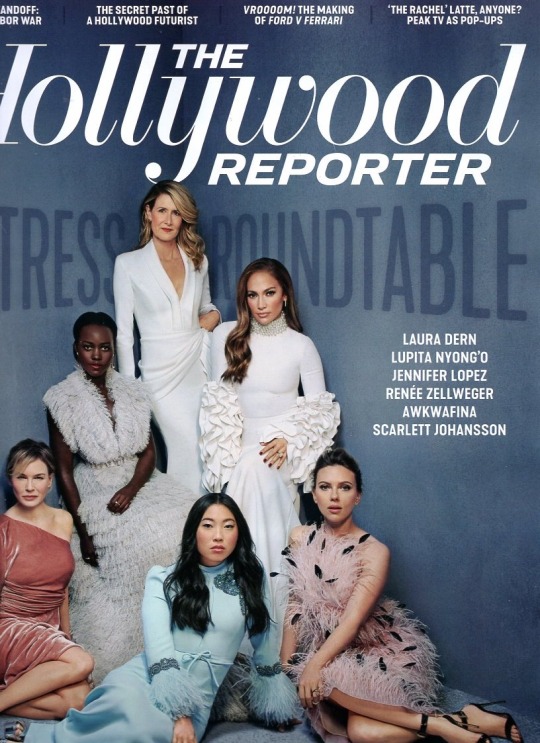
Page 4: Contents
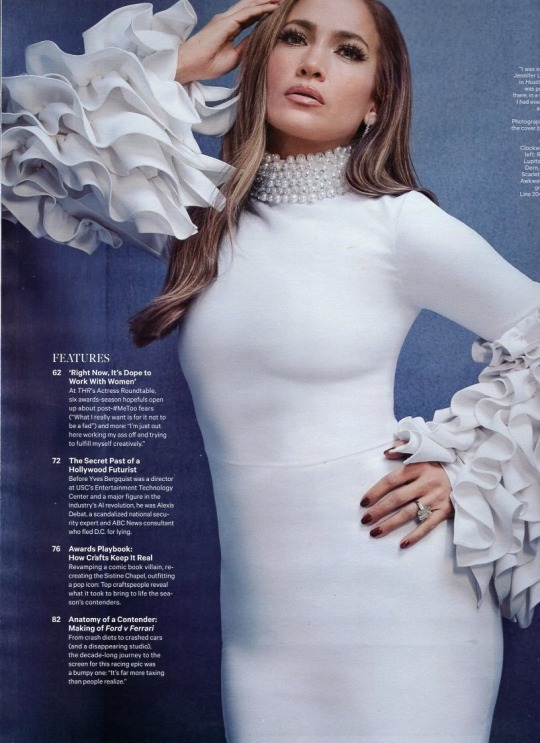
Page 6: Contents
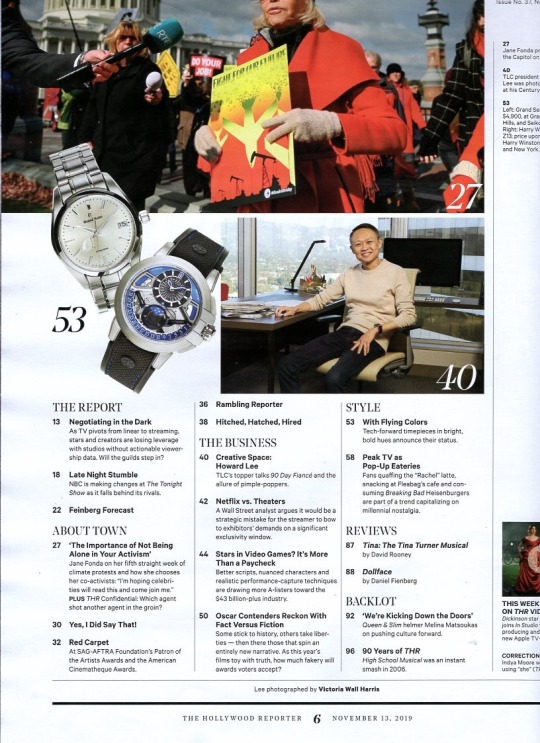
Page 13: The Report -- Streaming TV’s ‘Black Box’ and the coming Guild War
Page 16: Disney’s ‘FX on Hulu’ Plan Snubs Pay TV to Boost Digital Battle, Viacom Makes ‘Agressive’ Play to Remake Its Leadership
Page 18: Can NBC Halt Jimmy Fallon’s Long Ratings Tumble?, Amazon Takes Netflix’s Theater Playbook
Page 20: Box Office, Broadcast TV, Cable TV, Billboard Hot 100, Billboard 200, Closer Look -- LGBTQ’s TV Visibility Grows
Page 22: Awards Season -- Documentary Feature -- Apollo 11, Prosecuting Evil: The Extraordinary World of Ben Ferencz, David Crosby: Remember My Name, Best Actress -- Charlize Theron, International Feature Film -- The Traitor (Italy), Lionheart (Nigeria)/Joy (Austria), Makeup/Hairstyling -- Rocketman
Page 24: 7 Days of Deals -- Chernin Readies ‘2.0′ Media Fund: $700M to Shower on ‘Quality’ Buys, At AFM There’s the Best and Then Not Much Else, Rights Available -- Dangerous Alliance by Jennieke Cohen, Girl Serpent Thorn by Melissa Bashardoust, Film -- Colin Farrell and Andy Serkis are in talks to join The Batman as the Penquin and Alfred Pennyworth, Adam McKay, Emma Stone and Brad Pitt, Vanessa Hudgens and Alexandra Shipp
Page 25: Tenoch Huerta, Sadie Sink, Scott Neustadter and Michael H. Weber, Television -- Kate McKinnon, Ava DuVernay, Mary-Louise Parker, Courtney B. Vance, Digital -- Zoe Saldana and Reese Witherspoon, Adam Scott and Ben Stiller, D’Arcy Carden and Abbi Jacobson, Kaitlyn Dever and Jonathan Tucker, Will Graham, Kristen Bell, Michelle Wolf, Real Estate -- Oprah Winfrey and Jeff Bridges, Rep Sheet -- Wesley Snipes, Hong Chau, Swizz Beatz, Chris Lowell, Adrien Brody, One to Watch -- Rachel Gao
Page 27: About Town -- Jane Fonda and the ‘Ticking Existential Time Bomb’ in D.C.
Page 28: ‘One of Michael Crichton’s Most Iconic Pieces of Work,’ THR Confidential -- Hollywood history questions answered -- Which Agent Shot Another Agent in the Groin? Walter Wanger, Joan Bennett and Jennings Lang
Page 30: Yes I Did Say That! -- Reed Hastings, Katie McGrath, Kent Alterman, Phoebe Waller-Bridge, Joy Behar, John Legend, Amy Robach, Chris Jack, Flashback -- Kelsey Grammer
Page 32: Patron of the Artists Awards -- David Oyelowo and Ava DuVernay, Courteney Cox and Jennifer Aniston and Lisa Kudrow, Courtney B. Vance and Norman Lear and Willem Dafoe, Cynthia Erivo, Olivia Wilde, Mark Ruffalo and Laurence Fishburne, Awkwafina and Constance Wu, Gabrielle Carteris, Greg Berlant and husband Robbie Rogers, JoBeth Williams and Paul Rudd, Leonardo DiCaprio, Chrissy Metz and Diane Warren, Esai Morales and David Harbour and Julia Garner
Page 33: American Cinematheque Awards -- Charlize Theron and Seth MacFarlane, Kristen Stewart, Jason Reitman, Adam Aron and wife Abbe and son David and Les Coney, Donna Langley and Seth Rogen
Page 34: Baby2Baby Gala -- Gwyneth Paltrow, Kelly Sawyer Patricof and Kate Hudson and Jessica Alba and Chrissy Teigen and Kelly Rowland and Katy Perry and Norah Weinstein, Kobe Bryant and wife Vanessa, Camilla Belle and Molly Sims and Monique Lhullier and Jordana Brewster, Nikki Reed and Gina Rodriguez, Frozen 2 -- Idina Menzel and Kristen Bell, Bob Iger and Sterling K. Brown and wife Ryan Michelle Bathe, Jeremy Sisto and Jason Ritter, Jonathan Groff and Evan Rachel Wood and Josh Gad, Jennifer Lee and boyfriend Alfred Molina
Page 36: Rambling Reporter -- Chuck Lorre’s ‘stupid’ Scientology phase, agent Nick LoPiccolo survives ‘horror film’ car crash by inches, Twinning with Christian Bale and Matt Damon, Power Dining -- David O. Russell, Indya Moore, Jeremy Zimmer and Rich Paul, Mariah Carey, Goldie Hawn, Tom Ford, Pete Davidson, Henry Winkler, John Lasseter, Bob Iger, Frank Marshall, Barry Josephson, Marvin Levy
Page 38: Hitched, Hatched, Hired
Page 40: The Business -- Howard Lee
Page 42: Guest Column -- A ‘Disgrace’?! Netflix Should Avoid Wasting Money in Theaters
Page 44: Digital -- Stars in Games: It’s More Than a Paycheck -- Keanu Reeves, Norman Reedus, Jeremy Davies, Angela Sarafyan
Page 50: Behind the Screen -- Crafting a Scene-Stealing Cat in Captain Marvel
Page 51: The Race -- Oscar Contenders Reckon with Fact Versus Fiction
Page 56: Style -- Watches ‘to Impress and Express’ -- Niles Fitch, Aldis Hodge, Henry Golding, Chris Pratt
Page 56: Marlon Brando’s Rolex Hits the Auction Block
Page 58: Peak TV as Pop-Up Eateries: ‘It’s a Whole New Business Model’
Page 62: Cover Story -- The Actresses Roundtable
Page 73: The Secret Past of a Hollywood Futurist -- Yves Bergquist, Alexis Debat
Page 76: Awards Season -- Animated Feature -- Toothless, Elsa and Woody’s Three-Way Fight -- It’s a perfect storm with three giant franchises -- from Disney, Pixar and DreamWorks -- all competing against one another for the first time, and a slew of other films (including Netflix’s first original animated movie) aiming to earn a nomination slot
Page 77: Animated Short
Page 78: Makeup & Hairstyling -- crafting a ‘handmade’ joker, Production Design, Costume Design
Page 80: Song & Score
Page 82: The Making of Ford v Ferrari
Page 87: Reviews -- Tina: The Tina Turner Musical
Page 88: Dollface
Page 90: Social Climbers -- Actors -- Kevin Hart, Marlon Wayans, Scripted TV -- Game of Thrones, TV Personalities -- Maria Celeste Arraras
Page 92: Backlot -- ‘We’re Kicking Down the Doors’ -- Queen & Slim helmer Melina Matsoukas on pushing culture forward
Page 96: 90 Years of THR -- High School Musical was an instant smash in 2006
#tabloid#hollywood#actress roundtable#laura dern#lupita nyong'o#jennifer lopez#renee zellweger#awkafina#scarlett johansson
10 notes
·
View notes
Photo
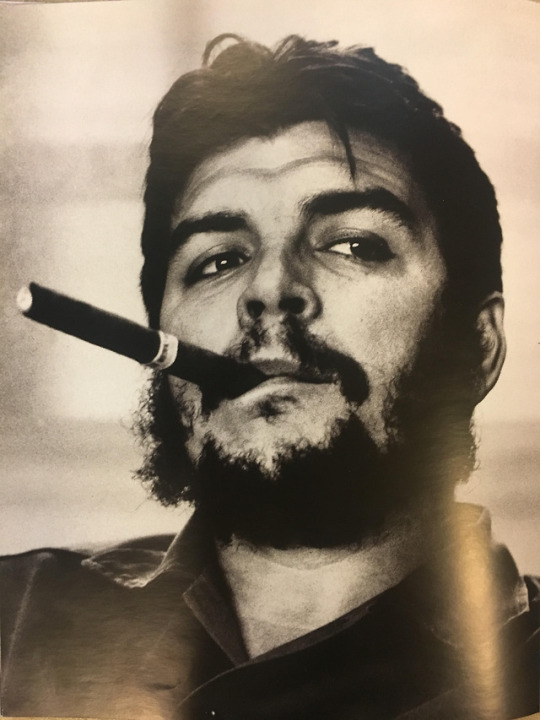

My take on Rene Burri’s photograph of Che Guevara from the book “FACE TO FACE the art of portrait photography”
Rene Burri’s is a Swiss photographer famous for being a member of the Magnum photos where he captured political, historical and and cultural events as well as the main figures of the 20th century’s second half. He photographed portraits of huge figures such as Pablo Picasso, São Paulo, and Brasília.
His photograph of Ernesto ‘Che’ Guevara smoking a cigar is one of the most iconic photographs of the Argentine revolutionary and cultural symbol. Che is a huge communist symbol in the cuban revolution. He was the guerrilla leader in South America and was executed in 1967.
In this photograph Che’s facial expression and gaze away from the lens gives off a sense of mystery and curiosity to the photograph which goes hand in hand with his personality. Burri enjoys putting Guevara behind his lens, he met up with him in 1963, on the 8th floor of the Hotel Riviera in Havana, Cuba, with reporter Laura Bergquist who interviewed Che. Berri described the interview to be intense as Bergquist and Che ideologies clashed which put Che in different kinds of moods. According to the guardian In 2010 Burri described how “for two and a half hours I could just dance around them with my camera. It was an incredible opportunity to shoot Che in all kinds of situations: smiling, furious, from the back, from the front. I used up eight rolls of film. He didn’t look at me once, he was so engaged with trying to convince her with maps and graphs. She was a chain-smoker, and he occasionally lit up one of his cigars.” Burris work managed to get featured on “FACE TO FACE the art of portrait photography” by Paul Ardenine who is a history professor, an art critic, and curator in contemporary art.
3 notes
·
View notes
Quote
Broadway Cares/Equity Fights AIDS has announced casting for its 2017 Broadway Backwards concert on March 13 at the Al Hirschfeld Theatre. Broadway Backwards is an annual celebration where gays and lesbians experience their stories as told through the great songs of musical theater. The evening is produced by Broadway Cares/Equity Fights AIDS and benefits BC/EFA and the Lesbian, Gay, Bisexual & Transgender Community Center of New York. Last year's edition featured a 67-person cast of Broadway and screen stars backed by a live orchestra. It raised a record $480,287. The company includes Sierra Boggess, Alex Brightman, Tituss Burgess, Len Cariou, Ariana DeBose, Lora Lee Gayer, John Glover, Jay Armstrong Johnson, Rachel Bay Jones, Levi Kreis, Andrew Keenan-Bolger, Javier Muñoz, Bobby Steggert, Andrew Rannells, Bobby Conte Thornton, Kathleen Turner, and Rachel York. Broadway Backwards creator Robert Bartley will direct the show, with Mary-Mitchell Campbell as music supervisor and Laura Bergquist as music director. Choreography will be created by Bartley, Christopher Rice, and Adam Roberts.
Tituss Burgess, Rachel Bay Jones, and Javier Muñoz Join 2017 Broadway Backwards (TheaterMania)
4 notes
·
View notes
Text
Learn More About the RCC Counseling Center Staff
We are proud of how the Rape Crisis Center Counseling Center continues to grow. We've added 25 weekly counseling hours, allowing us to serve more survivors of sexual violence than ever before. We are now able to offer counseling appointments 5 days a week, for people of all ages, in three languages (English, Spanish, and Farsi).
We're also able to provide support groups for adults, teens, parents of survivors, and survivors of trafficking, as well as specialized therapeutic services like weekly yoga and art therapy for survivors.
You can learn about each of our therapists, including the languages they speak and the populations they specialize in working with, below.
Dr. Kathleen Ja Sook Bergquist, LCSW, JD, PhD - Clinical Director Language(s): English Appointments: Wednesdays & Fridays Specializes in working with: Adult survivors of sexual violence & adult trafficking survivors Identifies as: Asian American
Laura Deitsch, LCPC Language(s): English Appointments: Mondays, Tuesdays, Wednesdays Specializes in working with: LGBTQ survivors of sexual violence, teen survivors of sexual violence, trafficking survivors
Sandra Morel, LMFT Language(s): English & Spanish Appointments: Thursdays & Fridays Specializes in working with: Adult survivors of sexual violence, teen survivors of sexual violence, those close to survivors (parents, siblings, partners, caretakers)
Dawn Canty, MFT Intern Language(s): English Appointments: Mondays through Fridays Specializes in working with: Adult survivors of sexual violence, teen survivors of sexual violence, LGBTQ survivors of sexual violence. Facilitates adult survivor support groups
Ashley Martinez, CPC Intern Language(s): English Appointments: Mondays, Tuesdays, Thursdays Specializes in working with: Adult trafficking survivors, teen trafficking survivors Facilitates trafficking survivor support group Identifies as: Hispanic
Sherin Roofian, LMFT Language(s): English, Spanish, Farsi Appointments: Mondays & Tuesdays Specializes in working with: Adult survivors of sexual violence, teen & child survivors of sexual violence, families affected by sexual violence Identifies as: Iranian-American
Holly Shank, CPC Intern Language(s): English Appointments: Wednesdays & Fridays Specializes in working with: Adult survivors of sexual violence, LGBTQ teen survivors of sexual violence. Facilitates teen survivor support group & art therapy
Sandy Simonton, MSW, LCSW, CCTP Language(s): English Appointments: Wednesdays & Thursdays Specializes in working with: Adult survivors of sexual violence, teen survivors of sexual violence. Facilitates parents of survivors support group in English
0 notes
Photo

(via Mostre in Calendario [156] – 22/10/2018)
Cosa troverete: Pino Pascali a Polignano a Mare; Picasso in Puglia; una mostra sul Bauhaus a Roma; Agostino Ferrari a Milano; Tiziano e Gerhard Richter aMantova; Andrea Famà a Torino; Marco Gastini a Milano; Eduardo Paolozzi aVenezia; Nari Ward a Santa Croce sull’Arno; Mats Bergquist a Milano; Sergio Lombardo a Roma; Ange Leccia a Milano; Isotta Bellomunno a Roma; Laura Lima a Milano; Todd Norsten a Milano; una collettiva a Roma; il Rome Art Week 2018 a Roma & more…
Clicca per vedere la lista: https://barbarapicci.com/2018/10/22/mostre-calendario-156/
0 notes
Text
LOOK! THE DESI-LUCY LOVE STORY
December 25, 1956
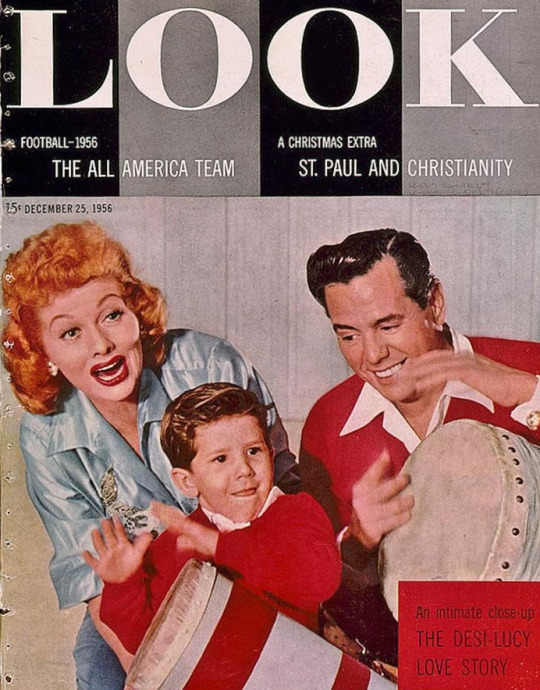
On this date in 1956, Lucille Ball, Desi Arnaz, and Keith Thibodeaux were on the cover of Look Magazine, volume 20, number 26. This was a ‘Christmas Extra’ edition. Photographs were by Robert Vose.
This was Lucille Ball’s fifth of nine Look covers from 1952 to 1971.
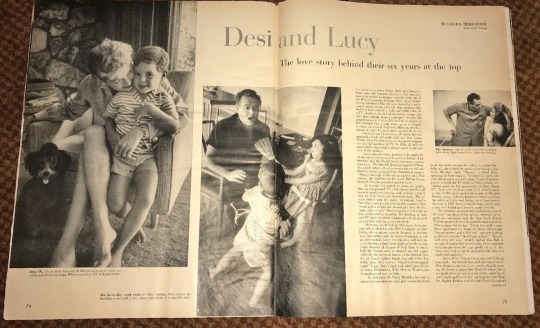
“Desi and Lucy: The Love Story Behind their Six Years at the Top”
The inside interview is by Laura Bergquist, who would interview Lucille Ball again for the September 7, 1971 edition of Look.
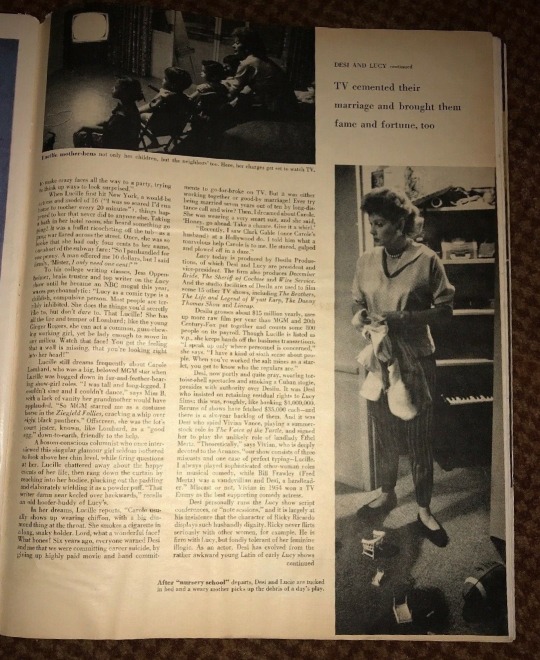
“TV cemented their marriage and brought them fame and fortune, too.”
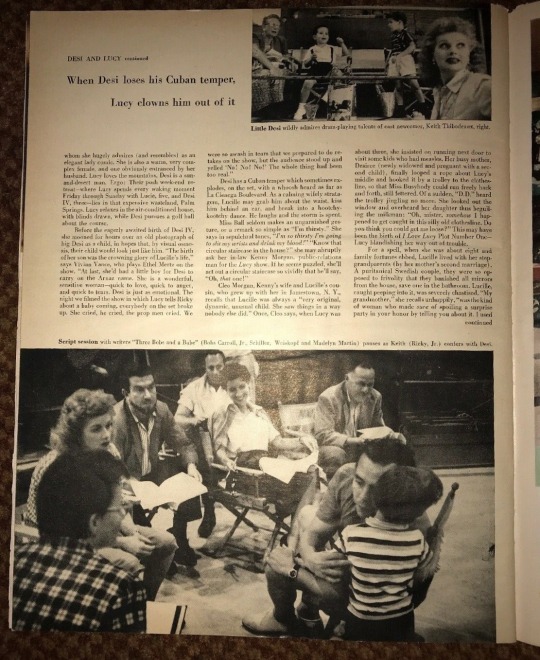
“When Desi loses his Cuban temper, Lucy clowns him out of it.”
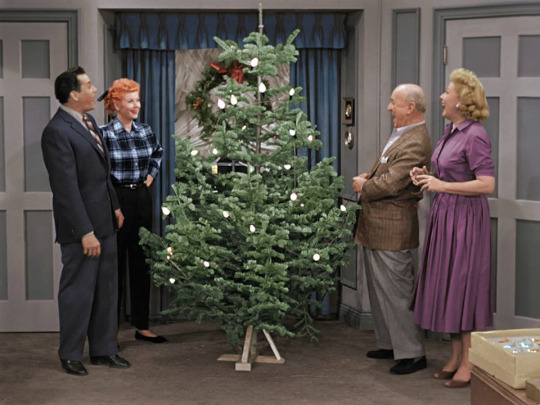
The day before this magazine was published, “I Love Lucy” presented their first “Christmas Show” which consisted of clips from three episodes and new holiday wrap-around footage. It wasn’t seen again until 1989. It was first colorized in 1990.

Christmas Day 1956 newspapers reported that Lucy and Desi sent out two Christmas cards: one of mom and dad and another smaller one from their kids.
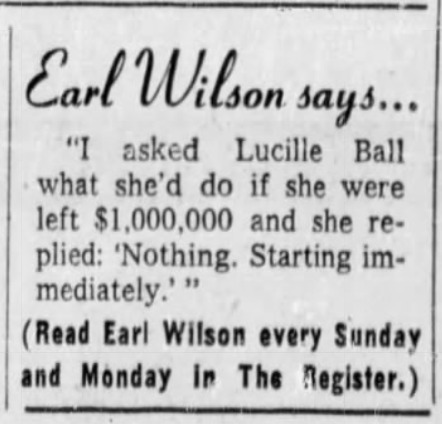
Earl Wilson item, December 25, 1956.
#Christmas#1956#I Love Lucy#Lucille Ball#Desi Arnaz#Keith Thibodeaux#Look Magazine#Ear Wilson#Christmas Cards#Vivian Vance#Lucie Arnaz#Desi Arnaz Jr.#William Frawley
18 notes
·
View notes